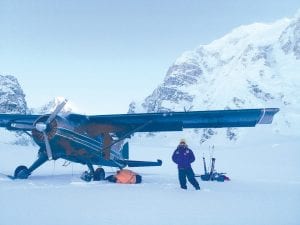After becoming the first person to solo climb Mount McKinley (Denali) two years ago, Lonnie Dupre took a one-year break from Alaska to climb some mountains in Nepal. This year he is back in Alaska making a solo attempt to climb Mount Hunter, a shorter but much more technical winter climb than Mount Denali. In 2004 Dupre was given one of the highest honors an explorer can receive when he was presented with the Rolex Award for Enterprise to commemorate his efforts to raise awareness about the effects climate change has had on the coldest parts of our planet.

Lonnie Dupre left Talkeetna, Alaska on Wednesday, January 4, flying into the Alaska Range to the base of Mount Hunter (14,573 feet) to attempt its first winter solo ascent.
Hunter is the steepest and most technical of the three significant peaks in Denali National Park. It is also known as the most challenging 14,000-foot peak in North America.
With a bluebird sky and temperatures in the teens, Dupre has decided that now is the time to start. Denali mountain forecasts are showing a decent weather window on the horizon.
With only 5-7 hours of daylight, much of the climb will be carried out in the darkness of sub-arctic winter. High winds and deep snow will be significant obstacles, but technical climbing in extreme cold poses the greatest challenge. Dupre will use a methodical alpine climbing strategy, making an ultra-light push from base to summit.
“I’m certainly at the threshold of my capabilities,” said Dupre. “It’s free climbing in very steep and technical terrain with a very heavy pack.”
Landing on the Kahiltna glacier in winter’s low light and unstable weather is no easy task. To land, it has to be calm and clear to take advantage of the small window of sun needed to provide depth of field on the surface of the glacier. Talkeetna Air Taxi’s Will Boardman flew Dupre in.
Dupre expects to start traveling towards the base of Mount Hunter on the fourth, after stashing supplies at base camp for his return.
Lonnie’s backpack will weigh between 55 to 60 pounds supplying him for 15 to 19 days; a humbling weight for the steep terrain.
Lonnie’s climb will be updated via his website with Dupre placing calls to his Globalstar satellite to his base camp each day. He can be followed at www.lonniedupre.com.


Leave a Reply